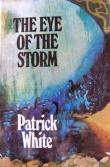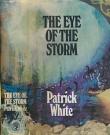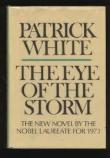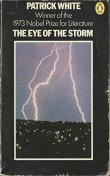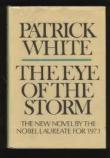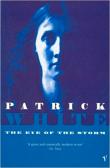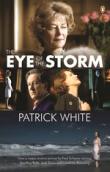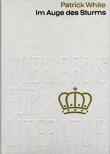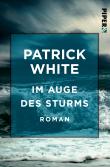AustLit
Latest Issues
AbstractHistoryArchive Description
"Elizabeth Hunter, an ex-socialite in her eighties, has a mystical experience during a summer storm in Sydney which transforms all her relationships: her existence becomes charged with a meaning which communicates itself to those around her. From this simple scenario Patrick White unfurls a monumental exploration of the tides of love and hate, comedy and tragedy, impotence and and longing that fester within family relationships."
Source: Penguin Books Australia.Adaptations
-
form
y
 The Eye of the Storm
( dir. Fred Schepisi
)
Australia
:
2011
Z1679559
2011
single work
film/TV
The Eye of the Storm
( dir. Fred Schepisi
)
Australia
:
2011
Z1679559
2011
single work
film/TV
'In a Sydney suburb, two nurses, a housekeeper and a solicitor attend to Elizabeth Hunter as her expatriate son and daughter convene at her deathbed. In dying, as in living, Mrs Hunter remains a formidable force on those around her. It is via Mrs Hunter's authority over living that her household and children vicariously face death and struggle to give consequence to life.
'Estranged from a mother who was never capable of loving them Sir Basil, a famous but struggling actor in London and Dorothy, an impecunious French princess, attempt to reconcile with her. In doing so they are reduced from states of worldly sophistication to floundering adolescence.
'The children unite in a common goal - to leave Australia with their vast inheritance. Moving through Sydney's social scene, they search for a way to fulfil their desire. Using the reluctant services of their family lawyer Arnold Wyburd, a man long in love with Mrs Hunter, they scheme to place their mother in a society nursing home to expedite her demise.
'Panic sets in as the staff sense the impending end of their eccentric world. Mrs Hunter confesses her profound disappointment at failing to recreate the state of humility and grace she experienced when caught in the eye of a cyclone fifteen years earlier.
'For the first time in their lives, the meaning of compassion takes the children by surprise. During a ferocious storm Mrs Hunter finally dies, not through a withdrawal of will but by an assertion of it. In the process of dying she re-lives her experience in the cyclone. Standing on a beach, she is calm and serene as devastation surrounds her.'
Source: Fred Schepisi's website, http://www.fredschepisi.com/
Sighted: 09/08/2011
Notes
-
Dedication: To Maie Casey.
-
Epigraph:
I was given by chance this human body so difficult to wear. - No Play
He felt what could have been a tremor of heaven's own perverse love. - Kawabata
Men and boughs break;/ Praise life while you walk and wake;/ It is only lent. - David Campbell
Publication Details of Only Known VersionEarliest 2 Known Versions of
Other Formats
- Braille
- Sound recording.
Works about this Work
-
What Makes a Good Literary Hoax? A Political Point, for Starters
2021
single work
column
— Appears in: The Conversation , 26 October 2021;'Literary hoaxes thrive on exposure. At best, they are politically transgressive. They strip away anything smug, pretentious or hypocritical to reveal an uglier reality underneath.'
-
Beautiful and Clumsy
2019
single work
column
— Appears in: The Australian , 8 June 2019; (p. 16) -
y
 Reading Corporeality in Patrick White’s Fiction : An Abject Dictatorship of the Flesh
Leiden
:
Brill
,
2019
15911959
2019
multi chapter work
criticism
Reading Corporeality in Patrick White’s Fiction : An Abject Dictatorship of the Flesh
Leiden
:
Brill
,
2019
15911959
2019
multi chapter work
criticism
'In Reading Corporeality in Patrick White's Fiction: An Abject Dictatorship of the Flesh, Bridget Grogan combines theoretical explication, textual comparison, and close reading to argue that corporeality is central to Patrick White's fiction, shaping the characterization, style, narrative trajectories, and implicit philosophy of his novels and short stories. Critics have often identified a radical disgust at play in White's writing, claiming that it arises from a defining dualism that posits the 'purity' of the disembodied 'spirit' in relation to the 'pollution' of the material world. Grogan argues convincingly, however, that White's fiction is far more complex in its approach to the body. Modeling ways in which Kristevan theory may be applied to modern fiction, her close attention to White's recurring interest in physicality and abjection draws attention to his complex questioning of metaphysics and subjectivity, thereby providing a fresh and compelling reading of this important world author.'
-
Peevish Paddy and Sir Neddy : Patrick White’s Nobel Prize
2018
single work
— Appears in: Meanjin Online 2018; -
“The Cyclone Which Is at the Heart of Things” : The Cyclone as Trope of Place and Apocalypse in Queensland Literature
2016
single work
criticism
— Appears in: Etropic , vol. 15 no. 2 2016;'In order to better understand and respond to the tropics as part of the global environment, we need to accept the unique features of the regional weather, such as cyclones, and be prepared to embrace their larger meaning for life in the tropics. In a physical landscape impacted by some 207 tropical cyclones since 1858, Queensland writers have attempted to incorporate both the terror and the sublime of the cyclone into their sense of place as they have attempted to find context for the unpredictable, chaotic and destructive tropical cyclone within their ostensibly tamed and ordered natural landscape. Consequently, the cyclone has become a defining symbolic metaphor of not only physical but also of literary tropical Queensland.
'Some Queensland writers have perceived within cyclones the Burkean sublime or personal revelation, while others have seen it as motivation for community strength, cooperation and compassion. For some, the purpose of the cyclone is divine retribution, but to others it’s an apocalyptic event revealing a rare second chance for revelation and renewal. This paper will examine a range of such perceptions within Queensland literature as part of the search for meaning within cyclonic chaotic events.' (Publication abstract)
-
Culture Vulture
2003
single work
review
— Appears in: The Weekend Australian Magazine , 20-21 September 2003; (p. 10)
— Review of The Eye of the Storm 1973 single work novel -
[Review] The Eye of the Storm
1973
single work
review
— Appears in: The Times Literary Supplement , 21 September 1973; (p. 1072)
— Review of The Eye of the Storm 1973 single work novel -
[Review] The Eye of the Storm
1973
single work
review
— Appears in: The Spectator , vol. 231 no. 1973; (p. 312-13)
— Review of The Eye of the Storm 1973 single work novel -
[Review] The Eye of the Storm
1973
single work
review
— Appears in: The Observer , 9 September 1973; (p. 37)
— Review of The Eye of the Storm 1973 single work novel -
Patrick White's Latest Novel
1973
single work
review
— Appears in: Hemisphere , December vol. 17 no. 12 1973; (p. 35)
— Review of The Eye of the Storm 1973 single work novel -
Patrick White's Aesthetic
1984
single work
criticism
— Appears in: LiNQ , [Triple Issue] vol. 12 no. 1-3 1984; (p. 55-70) The Pathos of Distance 1992; (p. 304-319) -
Patrick White and the Aesthetics of Death
1987
single work
criticism
— Appears in: LiNQ , vol. 15 no. 2 1987; (p. 2-14) The Pathos of Distance 1992; (p. 290-303) -
Mandala Symbolism in the Novels of Patrick White
1995-1996
single work
criticism
— Appears in: The Commonwealth Review , vol. 7 no. 1 1995-1996; (p. 117-123) -
Patrick White: An International Perspective
1991
single work
criticism
— Appears in: Breaking Circles 1991; (p. 182-196) -
y
 The Structure of Two Novels by Patrick White : The Eye of the Storm (1973) and A Fringe of Leaves (1976)
1979
Z1163297
1979
single work
thesis
The Structure of Two Novels by Patrick White : The Eye of the Storm (1973) and A Fringe of Leaves (1976)
1979
Z1163297
1979
single work
thesis

